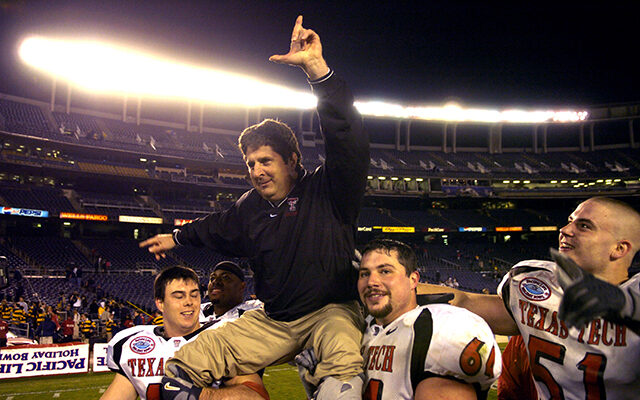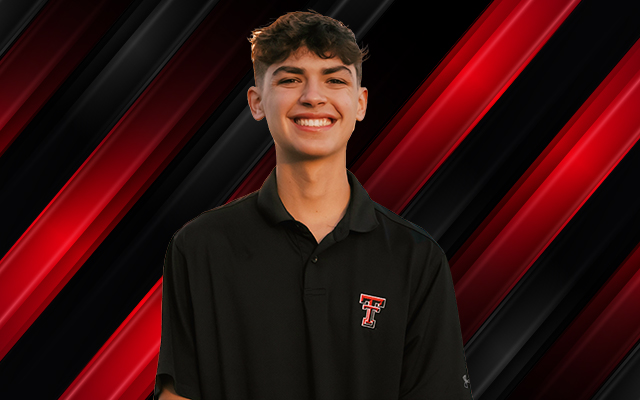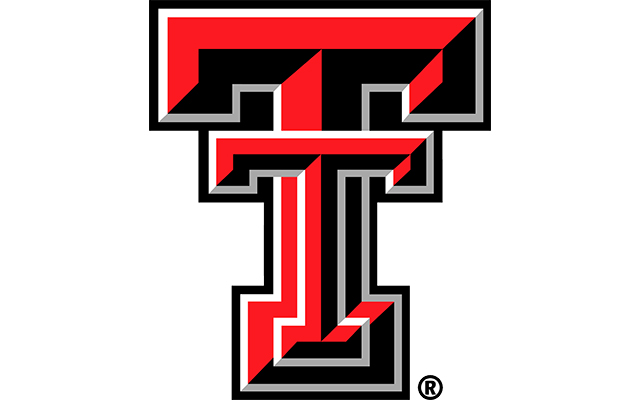RIP Mike Leach

Mike Leach, the unique, pioneering, unfiltered and beloved Texas Tech football coach who helped revolutionize the passing game with the Air Raid offense, has died following complications from a heart condition, Mississippi State said Tuesday. Leach compiled a 158-107 record in 21 seasons as a head coach.
As a final act of charity, Coach Leach donated his organs to help others.
Statement from Coach Leach’s Family:
“Mike was a giving and attentive husband, father and grandfather. He was able to participate in organ donation at UMMC as a final act of charity. We are supported and uplifted by the outpouring of love and prayers from family, friends, Mississippi State University, the hospital staff, and football fans around the world. Thank you for sharing in the joy of our beloved husband and father’s life.”
Swing Your Sword today friends.
Social Media on Coach Leach:
Texas Tech Statement on Coach Leach:
“Texas Tech Athletics joins the countless others across the game of football who mourn the passing of Mike Leach. Coach Leach will be forever remembered as one of the most innovative offensive minds in college football history. His impact on Texas Tech Football alone will live on in history as one of the greatest tenures in the history of our program. From his 84 wins to his record-setting offenses, Coach Leach quickly built a legacy here at Texas Tech that will never be forgotten. Our thoughts and prayers are with Coach Leach’s wife, Sharon, and their entire family during this difficult time.”
Leach remains Texas Tech’s all-time winningest coach after finishing 84-43 overall over his 10 seasons leading the Red Raiders from 2000-09. His tenure was highlighted by the Red Raiders’ 11 regular-season wins in 2008, which matched the Texas Tech single-season record for victories. The Red Raiders defeated No. 1 Texas that season, pushing Texas Tech to as high as No. 2 in the national rankings on its way to an appearance in the Cotton Bowl.
Following his tenure at Texas Tech, Leach spent eight seasons at Washington State, pushing the Cougars to a 55-47 record. He was in the midst of completing his third season as the head coach of Mississippi State at the time of his passing.
–TECH–
Release provided by Matt Dowdy Texas Tech Athletics
Mississippi State’s release on Coach Leach:
Mississippi State University President Mark E. Keenum said: “Coach Mike Leach cast a tremendous shadow not just over Mississippi State University, but over the entire college football landscape. His innovative “Air Raid” offense changed the game. Mike’s keen intellect and unvarnished candor made him one of the nation’s true coaching legends. His passing brings great sadness to our university, to the Southeastern Conference, and to all who loved college football. I will miss Mike’s profound curiosity, his honesty, and his wide-open approach to pursuing excellence in all things.
“Mike’s death also underscores the fragility and uncertainty of our lives. Three weeks ago, Mike and I were together in the locker room celebrating a hard-fought victory in Oxford. Mike Leach truly embraced life and lived in such a manner as to leave no regrets. That’s a worthy legacy. May God bless the Leach family during these days and hours. The prayers of the Bulldog family go with them,” Keenum said.
MSU Interim Athletics Director Bracky Brett said: “We are heartbroken and devastated by the passing of Mike Leach. College football lost one of its most beloved figures today, but his legacy will last forever. Mike’s energetic personality, influential presence and extraordinary leadership touched millions of athletes, students, coaches, fans, family and friends for decades.
“Mike was an innovator, pioneer and visionary. He was a college football icon, a coaching legend but an even better person,” said Brett. “We are all better for having known Mike Leach. The thoughts and prayers of Mississippi State University and the entire Bulldog family are with his wife Sharon, his children and the entire Leach family.”
Texas Tech on Coach Leach:
Arguably one of the most innovative coaches in the country, Mike Leach not only has transformed Texas Tech Football, but also the face of college football with an all-out aerial assault. This is evidenced by the number of programs incorporating more passing into their schemes than before. Leach’s offense has become a hot commodity as coaching staffs from across the country have come to Lubbock get a glimpse into what makes the program tick; but none have mastered it like the 10th-year coach. Leading the most prolific passing offense in the country, Leach, who received three national coach of the year awards in 2008 – the Woody Hayes Award, Howie Long/Fieldturf Coach of the Year, and George Munger Award – spreads the field with his exciting brand of football and has guided the Red Raiders to six NCAA passing titles and three total offense titles during his tenure. Leach’s offense produced school records in nearly every passing category in 2000, but surpassed those numbers in each of the last nine seasons. His nine teams have combined for more than 155 team and individual records at Tech. Texas Tech, which appeared in its second Cotton Bowl since 2005, experienced one of the most memorable seasons in school history in 2008 as the team set a program record with 11 regular-season wins en route to an 11-2 record. The win total tied the mark, set previously by the 1953 and 1973 squads. Numerous accolades poured in from across the country as an unprecendented four players earned first-team All-America status, in addition to Leach’s three coach of the year honors. Quarterback Graham Harrell, offensive tackle Rylan Reed and offensive guard Brandon Carter each garnered first-team honors, while wide receiver Michael Crabtree was honored as a unanimous consensus All-American for the second-straight season. On the field, the Red Raiders led the nation in passing for the sixth time in Leach’s nine seasons and ranked among the top five in total offense. Harrell finished his storied career second on the NCAA career passing yardage list with 15,793 yards. Harrell also broke the career NCAA passing touchdowns mark with 134. The Texas Tech program has established itself as one of the nation’s leading producers of productive quarterbacks since the 2000 season. Harrell threw for 4,555 yards in his debut as the starter in 2006 and became the sixth player and third Red Raider in NCAA history to throw for 5,000 yards in a season with his 5,705-yard effort in 2007 and 5,111 yards last season. He also is the third quarterback under Leach to win nine games in a season and the first Red Raider in history to win 11 in a regular season. Former quarterback Kliff Kingsbury in 2002 and Cody Hodges in 2005 each posted nine-win seasons during their careers, while 2003 and 2004 signal callers B.J. Symons and Sonny Cumbie each won eight games in their respective seasons as the starter. The Red Raiders have improved their total offensive numbers from 324.8 yards per game to 531.0 yards per game since Leach’s arrival. The last nine seasons rank as the top nine all-time at Tech in total offense, while scoring went from 23 points per game in 1999 to a school-record 43.8 points last season. The most significant increase has been in the passing game, where the Red Raiders averaged 475.3 yards per game in 2008 compared to 175.4 yards in 1999. The running game has flourished under Leach as well. Former Red Raider Taurean Henderson holds the NCAA career record for receptions by a running back. The Red Raiders’ 28 total rushing scores in 2008 were the most for a Tech team since the 1993 team scored 30. Despite Tech’s offense revolving around the pass, Leach has done a tremendous job of incorporating the running back position into the mix. Henderson finished his career with 303 receptions, which ranks first in NCAA history among running backs and fourth overall. The Red Raiders are not solely known for their play on the scoring side of the ball. The Texas Tech defense also has flourished during Leach’s nine seasons. The Red Raiders tied for the national lead with three shutouts in 2000 and followed with others in 2001, 2002, 2005 and 2006. Combined with the six shutouts are five other games where the opposition was held without an offensive touchdown. Tech’s shutout of Baylor in Waco during the 2005 season marked Tech’s first blanking of a conference opponent on the road since the inception of the Big 12 Conference in 1996. The play of the special teams also has improved with each season. Former placekicker Alex Trlica holds the NCAA record with 233 career extra points and another record for extra points made without a miss. He finished with 377 career points, which ranks among the top 10 in NCAA history among kickers. While leading the Red Raiders to 76 wins in his nine seasons, Leach is the only coach in school history to lead nine teams to bowl games. The 76 wins are the third-most among Big 12 coaches since the 2000 season. Although Leach’s presence has been felt throughout the team, it also has been beneficial for the players individually. In addition to picking up the Sammy Baugh Trophy in 2007, Harrell was the recipient of the National Football Foundation and College Football Hall of Fame’s Post-Graduate Scholarship and was one of 15 players selected as a candidate for the prestigious Draddy Award, the academic Heisman. Harrell also ranked fourth in last year’s Heisman voting, while Crabtree was fifth. Symons was the second Tech quarterback to receive The Touchdown Club of Columbus’ Sammy Baugh Trophy (Kingsbury in 2002). Kingsbury, a 2002 All-Big 12 first-team quarterback and sixth-round draft pick of the New England Patriots, led the Big 12 Conference in several passing categories during his final three seasons and was a Heisman Trophy candidate in 2002. He also was named the Verizon Academic All-American of the Year for football and was awarded an $18,000 postgraduate scholarship by the National Football Foundation and College Hall of Fame in a ceremony in New York City. In 2004, inside receiver Trey Haverty became the first Associated Press All-American since Montae Reagor in 1998, when he was selected to the third team. Free safety Dwayne Slay earned first-team All-America honors from Sports Illustrated in 2005, marking the first in seven seasons. Slay was one of the country’s most punishing tacklers that year and led the conference and finished second nationally with eight forced fumbles. Leach has coached several players who have gone on to the NFL. While at Tech, 17 players have been drafted and 21 others have signed free agent contracts. This past spring four players were selected among the first four rounds of the NFL Draft, marking the most successful draft for Texas Tech in the Leach era. Crabtree became the highest draft pick at No. 10, since Gabe Rivera in 1983. Crabtree, selected by the San Francisco 49ers, is the highest drafted Tech receiver since Dave Parks went No. 1 overall in 1964. Safety Darcel McBath was selected by the Denver Broncos in the second rounds, while offensive lineman Louis Vasquez was taken in the third by San Diego. Defensive end Brandon Williams went to the Dallas Cowboys in the fourth. The program continues to make strides academically as well under Leach. For the last nine years Tech has been recognized as one of the nation’s top institutions for consistently being above a 70 percent gradation rate, according to the American Football Coaches Association. In 2008, 17 players were named to the Big 12 Conference Academic Football Team. Prior to coming on board at Texas Tech, Leach, in just one season at Oklahoma, directed a Sooner offense that went from one of the worst in the Big 12 Conference to one of the best. Under Leach’s tutelage, Josh Heupel was named 1999 Big 12 Offensive Newcomer of the Year. For his efforts, Leach was nominated for the 1999 Broyles Award as the top assistant coach in the country. Leach guided an Oklahoma offense that went from 11th in the Big 12 in 1998 to first in 1999 and 101st in the nation to 11th. In just one year, OU’s total offense numbers improved from 293.3 to 427.2 yards per game. The rise in passing and scoring offense categories is just as impressive. Oklahoma went from last to first in the Big 12 in passing offense in one year, from 107th in the country to ninth. Under Leach, the Sooners improved from 109.9 yards passing per game to 321.7 yards per game. In 1998, Oklahoma was last in the Big 12 and 101st in the country in scoring offense at 16.7 points per game. In 1999, the Sooners improved to second in the league and eighth in the country in scoring at 36.8 points per game, an increase of just over 20 points per game. Under Leach, the Oklahoma offense set six Big 12 Conference and 17 OU records. The Sooners were one of only two schools in the nation to have six players with 20 or more receptions in 1999. Prior to joining Bob Stoops’ Oklahoma staff, Leach served as offensive coordinator for Hal Mumme at the University of Kentucky and Valdosta (Ga.) State University. For two years at Kentucky under Mumme, Leach coached the Kentucky [quote]Air Raid[quote] offense that was one of the most explosive in Southeastern Conference history. Under Mumme and Leach, the Kentucky offense set six NCAA records, 41 Southeastern Conference records and 116 school records in 22 games. Leach’s Kentucky offense featured the talented Tim Couch, who passed for 4,275 yards and 34 touchdowns as a senior. Named 1996 Division II Offensive Coordinator of the Year by American Football Quarterly magazine, Leach helped Mumme lead Valdosta State to a 40-17-1 record. The 1993 Blazer offense smashed 66 school records, 22 conference records and seven national records. In 1994, Valdosta State advanced to the Division II playoffs with Leach’s offense shattering 80 school records, 35 conference records and seven more national marks. Leach and Mumme first teamed up at Iowa Wesleyan College in 1989. From 1989 to 1991 Leach served as offensive coordinator and line coach for an offense that led the NAIA in passing yardage one season and finished second the other two. Iowa Wesleyan quarterbacks passed for more than 11,000 yards in Leach’s three seasons and broke 26 national records. Leach also has made coaching stops in Pori, Finland, where he served as a head coach in the European Football League (1989), as well as one-year stints at College of the Desert (1988) and Cal Poly-San Luis Obispo (1987). After graduating with honors from BYU in 1983, Leach earned a master’s degree from the U.S. Sports Academy and his law degree from Pepperdine University, where he graduated in the top one-third of his class. The oldest of six siblings, Leach and his wife, Sharon, are the parents of four children; Janeen (24), Kim (19), Cody (13) and Kiersten (10).
He was 61.



